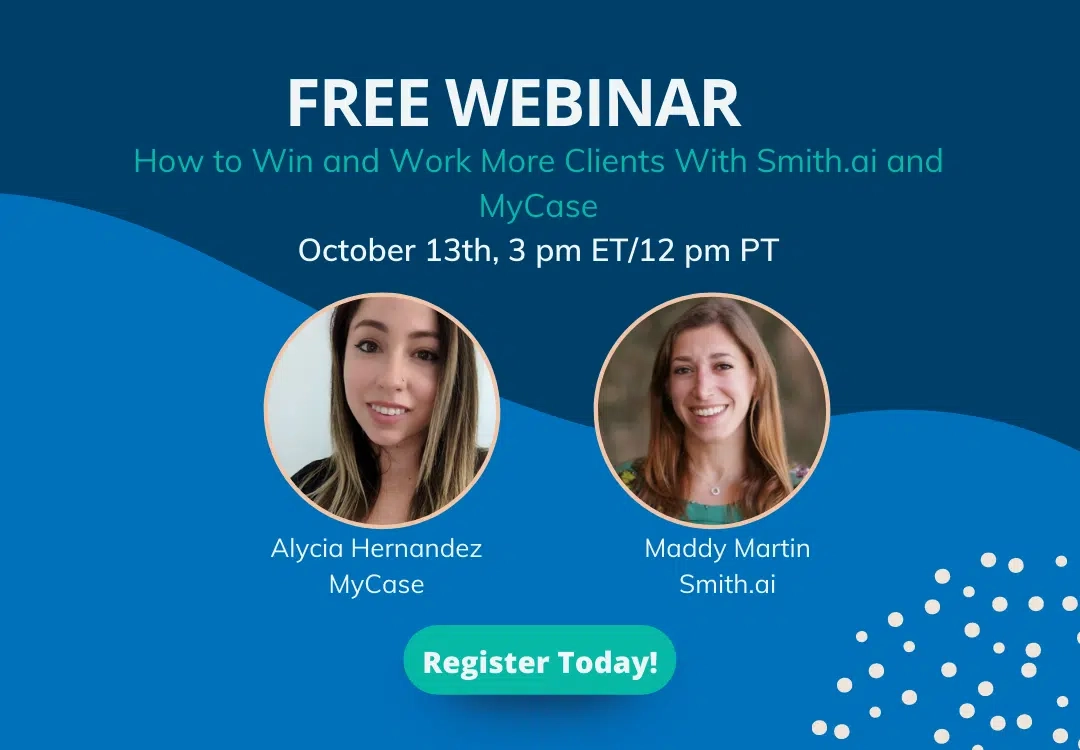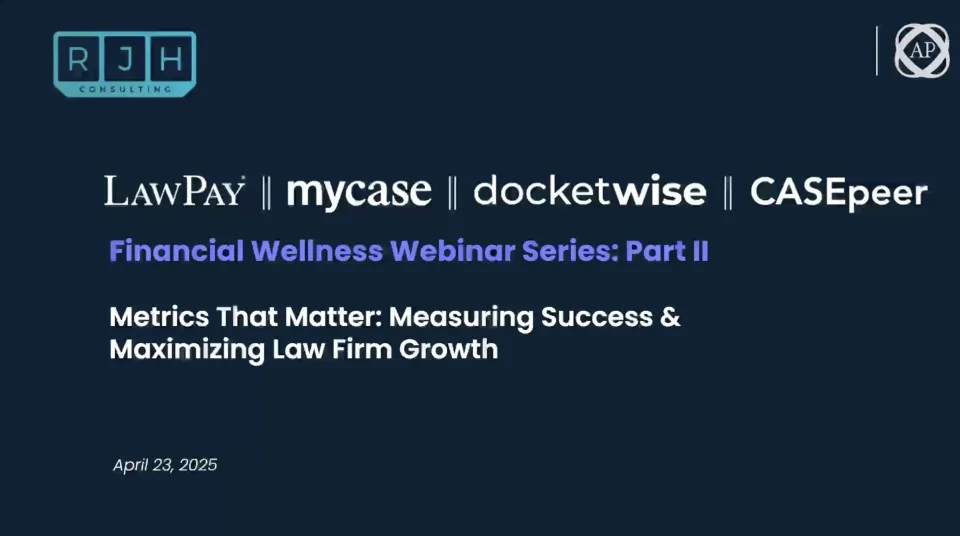Key takeaways
AI-powered marketing helps law firms with audience and competitor research, lead generation, content creation, reputation management, and performance optimization.
Use AI marketing for lawyers ethically by being transparent about its use and avoiding client confidentiality breaches.
Measure the ROI of AI tools by tracking lead generation, client engagement, and time spent.
Marketing is essential to growing your law firm, but it can also take precious time away from billable work. Between finding clients, developing content, managing your firm’s reputation, and your case load, it’s hard to find the time.
By handling tedious tasks, AI-powered marketing tools help law firms expand their marketing efforts without sacrificing billable time. At least 31% of legal professionals have found these tools can help with everything from generating leads to measuring the success of law firm marketing activities. You can increase your revenue by adopting AI tools to make your marketing more efficient and effective without adding more work.
In this guide, we break down how attorneys can use AI for legal marketing, what you can do with it, and how to measure its impact.
For more insights across everything from AI ethics to legal research to firm productivity, explore our AI for Law Firms Resource Center for the full library of expert articles.
What are the use cases of AI-enhanced marketing for law firms?
AI simplifies law firm marketing by handling repetitive tasks and administrative work, such as drafting social media posts or scheduling email newsletters. This allows you to focus on cases and higher-value tasks, such as achieving the best outcome for your clients.
These use cases include:
Creating marketing ideas
Generating outlines, drafts, or edits for content like blogs, emails, and social media posts
Helping attorneys identify best-fit client targets and develop a consistent brand
Analyzing marketing metrics
Audience research and targeting
When you first leverage AI for digital marketing for your law firm, you’ll need to provide it with your business information so it can understand your target clientele. To do so, you can upload files or submit information about your client demographics, practice areas, past case types, and any website data covering information like traffic sources. An AI tool will analyze this information, detect patterns about who interacts with your firm, and suggest ways to inform your marketing strategy.
Next, ask AI to put client types into segments and personas—for example, newly divorced individuals seeking custody representation or small business owners looking for contract reviews. From here, assess your most profitable segments and determine which channels or types of content work best.
For example, imagine you’re a small family law firm and using an AI analytics tool that integrates with your firm’s website and contact forms. Here’s the information you can discover:
Insight Category | AI’s Discovery/Suggestions |
|---|---|
Traffic source: | Mobile devices |
Timing: | Weekends |
Observed behavior: | The majority read custody blog posts before filling out an intake form |
Persona suggestion: | Professional parents seeking custody advice |
Content suggestion: | Publish more custody-related content, focus on weekend engagement, and run targeted ads |
AI can help you discover that most of their traffic comes in via mobile devices on weekends, and most site visitors read a few blog posts about custody before filling out an intake form. The system could then suggest a persona like “professional parents seeking custody advice” and recommend additional content, the best times to publish it for engagement, and targeted ad ideas.
Lead generation and management
Lead generation can take time and effort away from actual legal work, but AI lead generation tools can save you time and expand your efforts by:
Assessing where prospects originate and which sources are likely to convert
Pulling and analyzing data from web forms, social ads, referrals, and other traffic
Using predictive analytics to forecast high-performing channels
Alongside lead capturing, AI can score and prioritize leads, assigning values based on criteria like practice area, location, or engagement level. Allowing you to quickly choose who to follow up with, avoiding wasted time and effort. Also, autonomous AI-powered chatbots can address simple customer inquiries and pre-qualify prospects before routing serious leads into your system.
A few other examples of how AI can support lead generation and management include:
Automated lead scoring based on fit, interest, and engagement
Integration with CRMs to input and update leads
Automated email or text sequences triggered for hot leads

Client communication
While legal communication requires a human touch, AI can assist with select areas of law firm client communication, like:
Intelligent text editing for external communications
Legal form summarization
Referral requests to satisfied clients upon a case closing
Also, AI can integrate with many of the tools you already use. For instance, an AI platform that integrates with CRMs or case management systems can write client message drafts or translate languages for you, as well as summarize documents.
Competitor and market research
Conducting research into competitors and the market in general can help you understand your firm's place in it, but this can be time-consuming.
You can share a list of competitors with your AI tool, then have it analyze their online strategies and predict trends. Once you have all of that information, AI can also produce ideas that help your firm stand out and generate more business.
For example, an AI tool can:
Analyze public reviews of your firm and competing firms to determine strengths and weaknesses.
Compare your firm's content with that of your competitors, then highlight the major differences so you can adopt those that may generate more traffic or buzz.
Assess firm websites to identify any areas of improvement on your firm's site or SEO.
Suggest ways to better position your firm after researching others in your practice area(s) or location.
Website content creation and optimization
Content marketing can be a major source of organic leads for law firms, but you likely don’t have the time to churn out thousands of words of content each week. Ask AI for content ideas, website optimization suggestions, and proofreading or editing. AI can also assist with content marketing by:
Generating an outline—or a first draft—for a blog post
Researching useful keywords to include for SEO
Proofreading your content for errors or missing information
Translating
Suggesting blog or website content ideas
Analyzing your website and suggesting improvements to SEO and UX
Social media
In the same way AI can help with content creation, it can also benefit law firm social media strategy and execution. Leverage A, whether you want to create written content or visuals, or simply understand the best times and days to post.
Here are a few examples:
Generating platform-specific captions, such as image text for Instagram or video scripts for TikTok or YouTube
Repurposing existing content like blog posts into visual or short-form text posts
Identifying the types of topics and posts that drive engagement, then suggesting ways you can implement them
Creating visuals like infographics or carousels to break down legal topics
Law firms use email marketing to engage prospects and stay in touch with current and former clients. Like content creation, managing a large email list well takes time and effort that busy attorneys may not have.
AI email tools can suggest compelling subject lines, useful ways to segment your lists, and the best times to send emails. Some tools can even segment lists automatically based on user data like open rates or demographic information.
Here are a few specific use cases and examples:
Generating compelling subject lines that clients can’t help but open
Segmenting your audience, such as into lists for prospects, former clients, and current clients
Drafting message content
Suggesting the best days and times to send and follow up on emails
Advertising
AI tools can also support law firm advertising, whether you want to go all out with a large budget or stick to the basics. You can use AI to suggest or analyze a possible advertising budget, tell you how much you could do with a specific dollar amount, or brainstorm ways to get your brand noticed while reducing costs.
It can also analyze past campaigns across sites like Google, Facebook, or LinkedIn and identify the best-performing assets and keywords. And it can adjust bids and ad targeting to improve your overall ROI.
Here are some AI-supported law firm advertising examples:
Monitor which demographics respond to certain types of ads.
Brainstorm ad copy or visuals based on past ad performance.
Adjust ad bids based on time of day, geography, and targeting.
Research competitor advertising and make suggestions to help your firm compete, such as improvements to your advertising strategy or collateral.
Reputation management
Reputation management is crucial to building and maintaining your law firm’s strong. Rather than spending hours combing the web for reviews, leverage AI tools to monitor reviews and mentions on social media, alerting your firm to all types of feedback.
For example, a family law firm looking to improve its reputation might follow this process:
Use a tool with sentiment analysis to highlight patterns in reviews.
Assess the tool’s insights for themes, like if several reviews say “slow to respond” or “great communication.”
Review the tool’s suggested responses and make any necessary changes.
Publish responses acknowledging the negative reviews and sharing the changes they’ve already made.
Note any uncovered issues so they can take the appropriate steps to resolve them and provide better service.
Performance optimization
Another way AI helps lawyers improve marketing is through performance management and optimization. AI tools gather marketing data from across platforms—like social media, email, or ads—and analyze the overall performance of your marketing strategy. Then, it can highlight what is and is not working well and suggest next steps to improve performance.
Examples include:
Providing big-picture guidance by analyzing analytics from all of your marketing platforms in a single place
Identifying trends across channels—like increased traffic from mobile, for instance—and recommending adjustments, like increased mobile optimization
Suggesting A/B testing for different channels, such as website practice area pages
What are the ethical considerations of using AI for marketing?
Engaging in ethical AI for lawyers means understanding important considerations like AI accuracy, governance requirements, and risks of plagiarism and a less authentic voice.
In general, these considerations may include:
Client confidentiality: Avoid entering sensitive information into an AI tool unless you can guarantee confidentiality.
Accuracy: Always review information from AI, especially AI content for law firm websites, as it can produce incorrect information.
Bias and fairness: Evaluate outputs for fairness, as not all AI is trained the same and may display unintentional biases.
Transparency: Be clear with clients about how your firm uses AI and when they’re communicating with an AI tool rather than a human.
Oversight and human review: Determine how you will ensure human oversight and approval of all AI-generated work.
Authenticity: Review AI content to ensure it aligns with your brand voice, authority, and identity.
Accountability: Check AI outputs for plagiarism or replication of existing content.
Compliance with state bars and other requirements: Review relevant regulations to ensure you stay within their bounds.
Unauthorized practice of law: Configure AI chatbots to avoid giving information that could be misconstrued as official legal advice.
What types of AI marketing tools can law firms leverage?
Law firms can benefit from AI marketing tools that streamline and automate marketing, communication, and business operations.
These legal AI tools can generate and convert leads, engage your prospects and clients, and track your marketing performance. Common AI marketing tools for law firms include:
Chatbots: Use an AI-powered legal chatbot to provide immediate responses and answers to prospective clients. Chatbots can also help you qualify and score leads as they come in.
Generative AI and writing assistants: The best AI tools for legal writing help you draft and optimize blog posts, website copy, social media posts, or any other content you want to create.
Email automation tools: Divide your email list into segments, personalize your outreach, and schedule automatic campaigns and follow-ups.
Predictive analytics tools: Use historical data to forecast future client needs and identify the most beneficial marketing channels.
Reputation management tools: Keep track of and respond to your firm's online reviews.

How can attorneys get started with AI-powered marketing?
Attorneys can kick off AI digital marketing by identifying where automation or data insights could have the most impact on their firm. Instead of sending everything to AI right away, it’s best to choose a tool, start small, and see what works, then gradually expand your use of AI to other parts of your marketing plan.
A cost-effective option is for lawyers to use ChatGPT, as it has a free version with a lot of functionality. Simply type in a prompt like, “Create three Google ad headlines and descriptions targeting people looking for [practice area] services in [city],” or “Draft an appointment reminder email and a referral request message for a legal client.”
To get started:
Assess your firm’s needs and budget: Consider where you currently spend the most time (or want the most help) and what your budget allows.
Decide where to start: Choose a function, like social media content creation or client communication, to dip your toe into AI.
Identify the tools, workflow changes, and resources needed: Research which AI tools integrate with your existing systems, how they fit with your current processes, and what resources you need for successful AI adoption.
Train your staff on the selected tools: Make sure your team understands how to use AI effectively and ethically, especially regarding client confidentiality.
How can law firms measure the ROI of AI tools for marketing?
You can measure the ROI of AI marketing tools by tracking whether they help generate more leads, enhance client engagement, or reduce time spent on administrative or manual tasks.
To do this, your firm should set clear benchmarks like web traffic, consultation requests, and conversion rates when you first implement AI. Then, compare results over time to see how your investment in AI is paying off.
Don’t forget about time gains. If AI tools make it possible to produce blog content or social posts in half the time, you can redirect that time to billable work, which is a win. Along the same lines, using a chatbot to address simple prospect questions or pre-qualify leads can take much repetitive work off your plate.
Use an analytics dashboard and regularly review the data to see how your performance is trending. For instance, you might track which blog posts bring in the most traffic, then update your content strategy to create similar content.

Expedite lead management with 8am MyCase
Law firm marketing can have a major impact when you use it to bring in more organic leads, create compelling content, optimize your advertising, or manage your firm’s reputation. Wokring with AI marketing tools can help you achieve these goals and grow your business.
As you become busier and generate more leads, MyCase lead management features help you track every prospect from the first contact to a signed contract—all within a single platform—so you can turn prospects into clients faster.
In addition to organizing and nurturing leads, MyCase offers AI-based legal writing tools that can quickly update writing style, change tone, or translate text from English to Spanish (and vice versa). Combining strong AI marketing tools with MyCase intelligent text editing features will position your firm as a major contender. Schedule a demo today to see how it works.
To see the specific tools firms rely on to support AI-powered workflows, check out 12 Best Legal AI Tools to Improve Firm Productivity.
FAQ about using AI for law firm marketing
About the author
Esther Park is a Content Writer and Senior SEO Manager at 8am. Her expertise lies in writing about emerging legal technologies and financial wellness strategies for law firms, among other topics.

